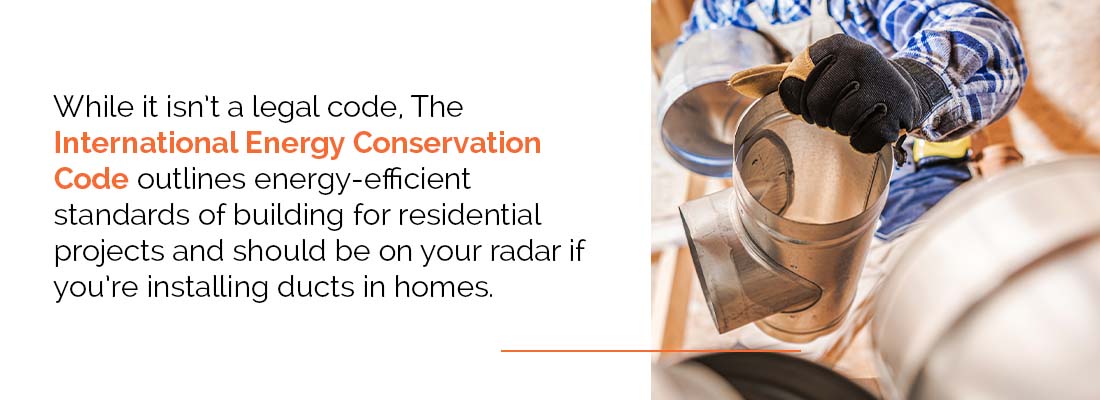HVAC duct installation is a complex process requiring careful consideration of multiple factors to ensure a successful outcome. No two projects are identical, and each poses unique challenges when attempting to minimize the ductwork installation costs and ensure the work meets specifications. Complicating the issue is that contractors must be familiar with four types of duct systems.
Compliance with the constantly evolving building codes and regulations is an area that requires close attention during any duct installation project. If your work isn’t up to code and building inspectors uncover violations, you could face substantial fines and penalties. You’ll also likely have to allocate significant time and labor to make the changes instead of working on new projects.
To keep your projects running smoothly and efficiently, it’s best to know the building codes before starting a project. Construction code is complicated, and it can be difficult to know who to consult as a source of authoritative information for code requirements for duct installation.
Table of Contents
- Are There Federal HVAC Code Requirements?
- State and Local Code Compliance for HVAC Ducts
- Residential HVAC Duct Installation Code Requirements
- Commercial Ductwork Installation Code Requirements
- Best Practices for Installers
- Building Codes and Ductwork Installation Cost
Are There Federal HVAC Code Requirements?
In the U.S., the individual states — not the federal government — are responsible for building construction code development and enforcement regarding HVAC duct installation and insulation. However, the U.S. Department of Energy (DOE) does play an important role in assessing and delivering feedback to publications from two key industry organizations — the International Energy Conservation Code (IECC) and American Society of Heating, Refrigerating, and Air-Conditioning Engineers (ASHRAE).
According to the Energy Conservation and Production Act (ECPA), the DOE must review the published editions of these codes and issue a ruling regarding whether the updated editions will improve energy efficiency in residential and commercial buildings. The DEO determined that Standard 90.1-2022 will achieve this objective. Accordingly, the ECPA requires that all states certify that they have reviewed the provisions of their commercial building codes and made any necessary energy efficiency updates by March 6, 2026.
Explore Our Ductwork Solutions
State and Local Code Compliance for HVAC Ducts
Each state determines its own building codes and how it will enforce and implement them. As such, it’s important to consult the appropriate state department or authority when you’re looking to ensure you’re following code requirements for installing HVAC ducts.
Some states don’t have a statewide building code and instead allow local jurisdictions to determine the codes they’ll enforce for building, such as return air duct code requirements. In these instances, you’ll need to consult the local authority for construction code to ensure you comply with code requirements for duct insulation.
If you install HVAC ducts in multiple states, you may be tempted to reference an online resource that lists the codes for every state. Be careful when relying on these sources. Building codes are always subject to change, and these online publications aren’t required to provide the most up-to-date information.
Instead, visiting the state website where you’re conducting duct installation is best. Navigate to the appropriate department’s page for the most accurate information, or locate the appropriate contact information for that department and speak with someone who can help you understand the codes that apply to your project.

Residential HVAC Duct Installation Code Requirements
Some states and local jurisdictions have duct installation code requirements for residential buildings. Because these are determined at the state level — and in some cases the local level — there are many different potential sources of HVAC code. Furthermore, states and jurisdictions can legislate and add or remove codes or amend existing ones.
As such, no comprehensive resource lists every residential HVAC code requirement. You’re best off consulting with the local building inspector when you’re trying to maintain residential compliance. While it isn’t a legal code, The International Energy Conservation Code outlines energy-efficient building standards for residential projects and should be on your radar if you install ducts in homes.
Commercial Ductwork Installation Code Requirements
ASHRAE’s ANSI/ASHRAE/IES Standard 90.1-2022 for Buildings Except Low-Rise Residential Buildings is a widely accepted industry publication that outlines standards of energy-efficient building practices for commercial facilities.
Among other construction considerations, Standard 90.1-2022 provides energy best practices for commercial buildings. It’s not an enforceable code requirement for commercial duct installation, but it’s definitely a standard you should keep in mind as you’re installing ductwork.
The DOE requires states to certify by 2026 that their building codes meet or exceed Standard 90.1-2022 for commercial buildings. This makes Standard 90.1-2022 an important consideration for duct installers, even though it is not technically a legal code.
There are other commercial duct installation code requirements, but these are determined by the state and occasionally by local government and can vary in applicability to a given project.
Ensure Code Compliance with Hennemuth’s Ductwork
Best Practices for Installers
There’s a lot to consider when installing HVAC ducts and systems. Code requirements are just one part of your responsibilities when working on an HVAC project. Here are a few best practices to follow when adhering to the HVAC code:
- Follow industry publications and organizations: Organizations such as The Sheet Metal and Air Conditioning Contractors’ National Association (SMACNA) and the Air Conditioning Contractors of America (ACCA) regularly meet, publish technical and business guidance for HVAC professionals, and provide accurate and timely information regarding industry standards and regulations.
- Do right by your customers: Completing safe, high-quality, energy-efficient, well-insulated and environmentally conscious HVAC projects is an easy way to align with many typical residential and commercial HVAC installation and insulation codes. It’s also an excellent way to establish and maintain a strong reputation as a business or contractor.
- If you don’t know the answer, know where to find it: Before you start a duct installation, know what local, state and federal jurisdictions enforce building codes in that area. Ensure your project is code-compliant by following the appropriate information channels these government departments and agencies use to inform construction companies and contractors of new and existing codes.
Building Codes and Ductwork Installation Cost
In addition to the compliance requirements, building codes can affect the cost to replace ductwork in a crawl space or other areas of a commercial or residential property. You will likely need to acquire the appropriate permits for the job type and scope, which can vary widely depending on the state and jurisdiction. If you use a ductwork replacement cost calculator, be sure to take this additional expense into account.
Speak With Our HVAC Code Experts Today
You don’t have to let an unintentional code violation prevent you from completing your residential or commercial HVAC duct installation projects. At Hennemuth Metal Fabricators, we can custom-fabricate high-quality ductwork to meet your requirements and help you stay compliant. We proudly serve the Pittsburgh area and beyond.
Take the next step and contact one of our ductwork specialists to request additional information and a project quote.

